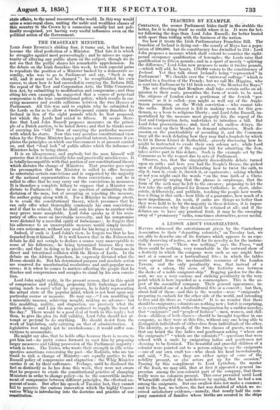THE IMAGINARY MINISTER.
LORD TORN RUSSELL'S abiding fear, it turns out, is that he may become the ideal perfection of a Minister. That fate it is which he struggles against most perseveringly ; and he misses no oppor- tunity of allaying any public alarm on the subject, though we do not see that the public shares his remarkable apprehension. In the debate on the Irish franchise this week, he tools especial pains to repudiate the position of a Minister backed by a democratic as- sembly, who was to go to Parliament and say, "Such is my will, and it must not be changed ": he recapitulated his own career, to show how he had succeeded in carrying the Reform Bill, the repeal of the Test and Corporation Acts, the Tithe Commuta- tion Act, by submitting to modification and compromise ; and thus citing his own example, he suggested that a course of perpetual compromise is the true constitutional policy, which results in car- iying measures and avoids collisions between the two Houses of Parliament. All this was said to explain why he submitted to the Lords so far as to allow a twelve-pound county franchise for Ireland in lieu of the eight pounds which he first proposed, but which the Lords had raised to fifteen. It seems there- fore that Lord John Russell proposes measures on the princi- ple of a Dutch auction, to be bated down; and that he thinks more of carrying his " bill " than of carrying the particular measure with which he starts. Now this very peculiar constitutional view token by the Prime Minister has a practical interest, because it ex- plains the principles on which our Government is at present carried on, and that "dead lock" of public affairs which the influence of Ministers helps to bring about. It is an idiosyncraey, and anybody but the man himself will perceive that it is theoretically false and practically mischievous. It U3 totallyincompatible with that portion of our constitutional theory which dictates the change of Ministers. That practice goes upon the presumption that the Minister is called to office because he entertains certain convictions and is supported by the majority of the national representatives in those convictions ; and he is called to office that he may carry out the convictions in measures. it is therefore a complete fallacy to suppose that a Minister can dictate to Parliament : there is no question of submitting to the dictation of the man, but of accepting or rejecting the measure, the author going along with it. VW' a Minister to change about, is to evade the eonstitational theory, which presumes that he can only offer what thoroughly ceinmands his OVOI CORYietiOn and if that be refused, that he shall cede his place to another who may prove more• acceptable. Lord John speaks as if his occu- pancy of office were an inevitable necessity, and his compromise were dictated by a merciful spirit of forbearance : he forgets that his adherence to an unacceptable measure would simply involve his own retirement, without any need for his being a tyrant.
Indeed, if such is Lord John's view, he forgets too that he has departed from it himself. It is well known that in the Palmerston debate he did not scruple to declare a course very unacceptable to some of his followers,—he being tyrannical because they were servile; and that in doing so he placed the House of Commons in direct and intentional collision with the House of Lords. In the debate on. the African Squadron, he expressly dictated what the House should do. But his determined psupose and resolute action are reserved for unsubstantial resolutions and anti-popular mea- sures ; it is when he comes to matters affecting the people that he flinches and compromises and scruples to stand by his own convic- tion.
Lord John might reply, in the present season, that in this spirit of compromise and yielding, proposing little tinkerings and not oaring much to carry what he proposes, he is fairly representing the actual state of the popular mind, which is not bent upon any particular course or measure. He may say—" I am muddling in a miserable manner, achieving nought, making no advance but this muddling, nullity, and stagnation, are precisely what the public desire; and I am the man produced to supply the want of the day." There would be a good deal of truth in this reply ; but then, to give the plea its full validity, Lord John should not at- tempt or pretend to do anything. He should desist from the work of legislation, only carrying on that of administration. A legislative rest might not be unwholesome ; it would suffer con- victions to accumulate.
He might say also, that he holds office because there is no one to ut him out—no party comes forward to oust him by proposing measures and taking possession of the Parliament majority : which-is true. The Tories, who waste their strength in idle retro- spective assertions concerning the past—the Radicals, who are too timid to risk a change of Ministry—are equally parties to the Russell policy of compromise and stagnation : the Whig Minister carries it on by their sufferance. Perhaps, until he disclosed the fact so distinctly as he has done this week, they were not aware that he proposes to evade the constitutional practice of changing Ministers in order to change policy—to be the convertible instru- ment of compromise between different principles, the effectual ex- ponent of none. But after his speech of Tuesday last, they cannot fail to perceive the curious innovation which the highly Conser- vative Whig is introducing into the doctrine and practice of our constitution.


























 Previous page
Previous page